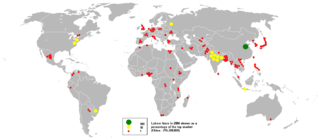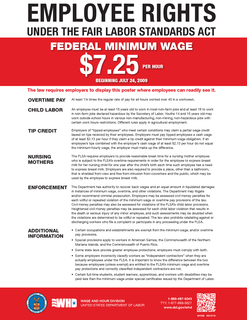
The Social Security Act of 1935 Pub.L. 74–271, 49 Stat. 620, now codified as 42 U.S.C. ch. 7, created Social Security in the United States, and is relevant for US labor law. It created a basic right to a pension in old age, and insurance against unemployment.

The Labor Management Relations Act of 1947 29 U.S.C. § 141-197, better known as the Taft–Hartley Act, is a United States federal law that restricts the activities and power of labor unions. The act, still effective, was sponsored by Senator Robert A. Taft and Representative Fred A. Hartley, Jr., and became law despite U.S. President Harry S. Truman's veto on June 23, 1947. Labor leaders called it the "slave-labor bill" while President Truman argued that it was a "dangerous intrusion on free speech", arguing that it would "conflict with important principles of our democratic society". Nevertheless, after it passed Truman relied upon it in twelve instances during his presidency. The Taft–Hartley Act amended the National Labor Relations Act, which Congress passed in 1935. The principal author of the Taft–Hartley Act was J. Mack Swigert, of the Cincinnati law firm Taft, Stettinius & Hollister.

Workers' compensation is a form of insurance providing wage replacement and medical benefits to employees injured in the course of employment in exchange for mandatory relinquishment of the employee's right to sue their employer for the tort of negligence. The trade-off between assured, limited coverage and lack of recourse outside the worker compensation system is known as "the compensation bargain". One of the problems that the compensation bargain solved is the problem of employers becoming insolvent as a result of high damage awards. The system of collective liability was created to prevent that, and thus to ensure security of compensation to the workers. Individual immunity is the necessary corollary to collective liability.
Employment is a relationship between two parties, usually based on a contract where work is paid for, where one party, which may be a corporation, for profit, not-for-profit organization, co-operative or other entity is the employer and the other is the employee. Employees work in return for payment, which may be in the form of an hourly wage, by piecework or an annual salary, depending on the type of work an employee does or which sector she or he is working in. Employees in some fields or sectors may receive gratuities, bonus payment or stock options. In some types of employment, employees may receive benefits in addition to payment. Benefits can include health insurance, housing, disability insurance or use of a gym. Employment is typically governed by employment laws, regulations or legal contracts.
Unemployment benefits are payments made by back authorized bodies to unemployed people. In the United States, benefits are funded by a compulsory governmental insurance system, not taxes on individual citizens. Depending on the jurisdiction and the status of the person, those sums may be small, covering only basic needs, or may compensate the lost time proportionally to the previous earned salary.
A layoff is the temporary suspension or permanent termination of employment of an employee or, more commonly, a group of employees for business reasons, such as personnel management or downsizing an organization. Originally, layoff referred exclusively to a temporary interruption in work, or employment but this has evolved to a permanent elimination of a position in both British and US English, requiring the addition of "temporary" to specify the original meaning of the word. A layoff is not to be confused with wrongful termination. Laid off workers or displaced workers are workers who have lost or left their jobs because their employer has closed or moved, there was insufficient work for them to do, or their position or shift was abolished. Downsizing in a company is defined to involve the reduction of employees in a workforce. Downsizing in companies became a popular practice in the 1980s and early 1990s as it was seen as a way to deliver better shareholder value as it helps to reduce the costs of employers. Indeed, recent research on downsizing in the U.S., UK, and Japan suggests that downsizing is being regarded by management as one of the preferred routes to help declining organizations, cutting unnecessary costs, and improve organizational performance. Usually a layoff occurs as a cost-cutting measure.

Nafarroa Bai was a Navarrese coalition in Spain of Basque nationalist and regional left-wing parties created in 2003 for the 2004 Spanish General election.

A referendum on the treaty establishing a Constitution for Europe was held in Spain on 20 February 2005. The consultative referendum on ratification of the proposed Constitution of the European Union was approved by 81.8% of voters, although turnout was just 41.8%, the lowest since the end of the Franco era.

For all intents and purposes, the history of contemporary Spain began with the death of caudillo Francisco Franco on the 20 November 1975, the accession of King Juan Carlos I to the throne and the establishment of the parliamentary monarchy. In 1978, the current Spanish Constitution of 1978 was signed and the status of Spain's autonomous entities (autonomías) was defined.
A permatemp is a temporary employee who works for an extended period for a single staffing client. The word is a portmanteau of the words permanent and temporary.
Japanese labor law is the system of labor law operating in Japan.
Sick leave is time off from work that workers can use to stay home to address their health and safety needs without losing pay. Paid sick leave is a statutory requirement in many nations. Most European, many Latin American, a few African and a few Asian countries have legal requirements for paid sick leave.
S. 2691/H.R. 5744, also known as the "Securing Knowledge Innovation and Leadership Act of 2006", or the "SKIL Bill" from its acronym and rhyme, is targeted at increasing legal immigration of scientific, technology, engineering, and mathematics (STEM) workers into the United States by increasing the quotas on the H-1B visa, eliminating green card caps for certain advanced degree holders, and streamlining the processing of employment-based green cards. A summary of changes to each of these is:
In Italy, unemployment benefits are guaranteed by the Constitution. Article 38 states "[...] workers have the right to the provision of financial support sufficient to meet their needs in case of accidents at work, ill health, disability, old age and involuntary unemployment [...]". Esping-Andersen traces in this persistency the origins of the chronically high Italian unemployment rates.

Labour in India refers to employment in the economy of India. In 2012, there were around 487 million workers in India, the second largest after China. Of these over 94 percent work in unincorporated, unorganised enterprises ranging from pushcart vendors to home-based diamond and gem polishing operations. The organised sector includes workers employed by the government, state-owned enterprises and private sector enterprises. In 2008, the organised sector employed 27.5 million workers, of which 17.3 million worked for government or government owned entities.

The Fair Labor Standards Act of 1938 29 U.S.C. § 203 (FLSA) is a United States labor law that creates the right to a minimum wage, and "time-and-a-half" overtime pay when people work over forty hours a week. It also prohibits most employment of minors in "oppressive child labor". It applies to employees engaged in interstate commerce or employed by an enterprise engaged in commerce or in the production of goods for commerce, unless the employer can claim an exemption from coverage.
Iranian labor law describes the rules of employment in Iran. As a still developing country, with an authoritarian government, Iran is considerably behind by international standards. It has failed to ratify the two basic Conventions of the International Labour Organization on freedom of association and collective bargaining, and one on abolition of child labor. Countries such as the US and India have also failed to ratify many of these Conventions and a mere 14 other Conventions, only 2 since the Islamic Revolution.
The Labor policy in the Philippines is specified mainly by the country’s Labor Code of the Philippines and through other labor laws. They cover 38 million Filipinos who belong to the labor force and to some extent, as well as overseas workers. They aim to address Filipino workers’ legal rights and their limitations with regard to the hiring process, working conditions, benefits, policymaking on labor within the company, activities, and relations with employees.
The Middle Class Tax Relief and Job Creation Act of 2012, also known as the "payroll tax cut", was an Act of the United States Congress. The bill was passed by the U.S. House of Representatives on February 17, 2012 by a vote of 293‑132, and by the Senate by a vote of 60‑36 on the same day. The bill was signed into law by President Barack Obama on February 22, 2012.

María Fátima Báñez García, better known as Fátima Báñez, is a Spanish politician, economist and jurist. Since December 2011, she has been the Minister of Employment and Social Security.









